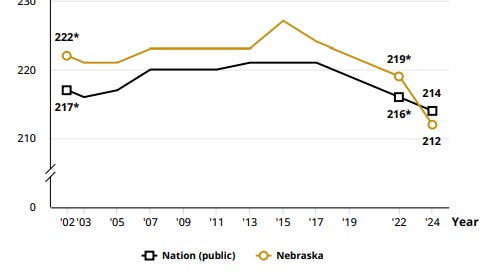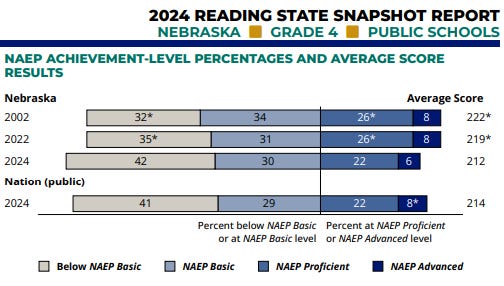Bad News, Good News Regarding Nebraska Literacy
The Nebraska Dept. of Education is taking this very seriously.
Photos from Nebraska Dept. of Education PowerPoint
The Bad News:
In 2019, The Nebraska Education Commissioner was on a Social Justice mission, and he was backed up by the liberal 8-member Nebraska Board of Education at that time. The Department showed their hand to the public with the 2021 “Health Standards” that included curriculum indirectly written by Planned Parenthood. Nebraskans took notice, and many public speakers in those packed 2021 ballroom State Board meetings expressed the concern that big-E Education was taking their eye off the primary mission of education— literacy.
Even parents who didn’t read statistics could feel the slippage in basic skills displayed by their students. The statistics from the testing of public school students show that 2015 was the apex year for literacy in Nebraska, and we have been on a downward slide ever since.
Focusing on 4th-grade reading scores; the national average was a score of 214. Nebraska did worse than that, 212, down 7 points from our 2022 score. Nebraska is one of only 5 states that cratered between 2022 and 2024. Keep in mind the national average is nothing to brag about. The U.S. has only 30% of 4th-grade students proficient in reading, Nebraska has 28%. The U.S. has 41% of 4th-graders “below basic” levels of literacy, Nebraska has 42%
• In 2024, Black students had an average score that was 36 points lower than that of White students. This performance gap was wider than in 2002 (17 points).
• In 2024, Hispanic students had an average score that was 25 points lower than that of White students. This performance gap was not significantly different from that in 2002 (23 points).
• In 2024, male students in Nebraska had an average score that was lower than that of female students by 8 points.
• In 2024, students who were identified as economically disadvantaged had an average score that was 28 points lower than that of students who were identified as not economically disadvantaged. This performance gap was not significantly different from that in 2002 (22 points).
Take from those nuggets what you will, it appears only White girls are not “disadvantaged.” Would private schools test better across the spectrum of students? We don’t know. However, these statistics do explain why “disadvantaged” parents are desperate for school choice.
By 2022, Nebraska was well past the Covid Shutdown, so the handy pandemic excuse does not apply here. Nebraska has more non-English speakers since 2022, but so does the rest of the country. Our current reading crisis points to a systemic problem.
The problem did not sneak up on us; literacy experts have been decrying the state of reading education for some time. As laid out in a previous substack of ours, A Revolution in Literacy, there has been a decades-long battle between two curriculum philosophies. The first is “Whole Language” otherwise known as “Balanced Literacy” which depends upon sight words and picture cues, and the second is “Science Of Reading” which depends upon phonics and sounding out words. That is a greatly simplified description, but it helps the uninitiated to understand the difference. The big money associated with the sale of Whole Language curriculum was a factor in why it took so long for the pendulum to swing back to phonics. Research shows the concepts associated with the Science Of Reading are the superior learning method for a majority of students, mainly because of the phonics component.
The University of Nebraska-Lincoln has been teaching “Whole Language” to students in the teacher’s college for many years. The latest generation of graduating teachers from our largest university do not know phonics.
The Good News:
Personnel is policy. Our new Commissioner of Education, Dr. Brian Maher, has been laser-focused on literacy since he took the helm in mid-2023. A well-respected past Superintendent of Kearney Public Schools, he most recently had a College Regent-type position in South Dakota. His heart-felt reason for applying for his current position in Lincoln was to solve the literacy crisis in the state where his grandchildren live.
“We are going to own these statistics,” said Maher. “We are not going to spin them. These results are not good enough for Nebraska. We are going to focus on the basics.”
Focusing on the basics has a proven track record according to this interesting article about Louisiana.
Our conservative State Board members, Sherry Jones, Elizabeth Tegtmeier, and Kirk Penner have been setting the table behind the scenes to launch what is being called “The Nebraska Literacy Project.” $55 million in grants have been earmarked for the effort. With a project this big, they are being mindful of where the money originates and how it can best be used.
Our newly elected State Board member from District 3 is a literacy expert. Lisa Schonhoff has taught reading, coached educators on reading, tutored reading and written curriculum for reading. Her career has taken her from international schools to inner-city schools to Bennington, NE. By law, she had to quit her teaching job to run for the Nebraska Board of Education. “It wasn’t a hard decision,” says Schonhoff, “I could see the struggles of my students firsthand, and I knew I could make a greater impact for them on the State Board, than I could in any one school district.”
Schonhoff is more than ready to dig into this issue as her tenure begins, and she will be addressing some reservations she has about the proposed implementation. Among other things, she expressed concern that the “High Quality Instructional Materials” being sold to school districts may not be as high quality as advertised.
Read Lisa Schonhoff’s comments and concerns toward the end of THIS ARTICLE. (Follow Lisa’s Literacy Newsletter HERE.)
Maher and Schonhoff both expressed the need for oversight to follow the funds. They foresee trained Literacy coaches in every district who will ensure teachers are supported and goals are being met. They agree that particular attention needs to be placed on grades K-2.
The Players
University of Nebraska-Lincoln
With a nudge from the Nebraska Dept. of Education, UNL is now on-board with the Science Of Reading (SOR) Curriculum. They have received grants for a WORDS project, an acronym for Workshops on Reading Development Strategies. It is a coaching program based upon SOR. From their website:
The WORDS Project (Workshops on Reading Development Strategies) is a research-driven professional development program designed to support the state of Nebraska’s efforts to improve early literacy skills among K-3 students.
With the launch of the 2018 Nebraska Reading Improvement Act, and its NebraskaREADS initiative, many districts and schools have expressed the need for training to implement and interpret the reading assessments and instruction required by law.
The WORDS Project addresses this need by providing effective, practice-based support and professional development to build capacity and prepare K-3 teachers to deliver high-quality reading instruction and assessment in schools across the state.
They offer these services, currently being piloted in Lincoln Public Schools, with an invitation to other districts who would like to participate (paraphrased):
1. Professional Development with both in-person workshops and online courses.
2. Training on how to interpret reading assessment data to identify needs.
3. Internships and training for reading coaches who will understand Nebraska law and approved practices.
4. Web-based tutoring directly to students.
University of Nebraska-Omaha
UNO’s Education College has an expert who Dr. Maher described as a “foremost authority on developing teachers in Science Of Reading.” She and her department have taken an integral role in developing coaching plans for Nebraska schools.
Dr. Jennifer Lemke has been a Nebraska educator for 21 years serving as a classroom teacher, reading interventionist, new teacher mentor and literacy professor.
“My work and passions have been grounded in serving Nebraska children and ensuring educators across the state feel better prepared to develop students into successful, lifelong readers.” - Dr. Jennifer Lemke
Dr. Lemke graciously shared information about the program.
“In 2023, in partnership with the Metropolitan Omaha Education Consortium (MOEC), we developed the Early Literacy Workshop to support Omaha area teachers to build educators’ knowledge of research informed early literacy instruction and provide resources to support K-3 educators’ planning and instruction. In partnership with NDE (Nebraska Dept. of Education) and private organizations, we were able to expand into a statewide model.
Our team has developed the NE Early Literacy Workshop, a 5-session in-person workshop that builds knowledge and instructional practices focused on early literacy foundational skills. With a focus on the components of foundational skills---print awareness, phonological awareness, phonics and word recognition, and fluency---participants will be able to identify concrete strategies to support student learning and practice. The workshop helps to build educators’ knowledge and skills of research informed early literacy instruction and provides resources to support K-3 educators’ planning and instruction.”
How it’s going:
“We have just completed the first iteration of the statewide model and the results of participants’ pre and post surveys indicate the workshop had a significant, positive effect on their overall knowledge and efficacy to provide effective foundational skills instruction. In partnership with NDE and Nebraska Educational Policy Research Lab (NEPRL), we will work with districts who participate to collect data to measure impact at the student level as well.
The NE Early Literacy team is working on plans to continue offering the workshop to educators during the 2025-2026 and 2026-2027 school years. Partnerships are being formed with Nebraska School Districts, ESUs, and private schools to offer the workshop to educators in either specific district groups or regional mixed district groups. Currently, the workshop is specifically designed for K-3 educators.”
There are plans to expand these workshops:
“We recognize the important role that both administrators and parents play in students’ literacy development. Building leaders are encouraged to participate in the workshop alongside their teachers and we have also created additional resources designed to support administrators in enhancing their knowledge and increasing teacher implementation of the content shared during the workshop sessions.
We also know that impact grows when schools and caregivers work together so we have created intentional opportunities throughout the workshop for participants to develop resources to equip families with tools to support their child at home.”
Administrators may contact NELiteracy@unomaha.edu for more information about the workshop.
What You Can Do
It has taken many years for the literacy crisis to develop, and it won’t turn around overnight.
You can encourage your school board, administrators and reading teachers to begin looking into the coaching available online at the UNL WORDS Project, and/or contact Professor Lemke at UNO to dial into a NE Early Literacy workshop.
Share this information with your elementary school principal. The resources to identify and train a literacy coach in each school building are there for the taking.
You may also contact the Nebraska Department of Education for more information.
NebraskaREADS Contact
Olivia Alberts, Reading Specialist, olivia.alberts@nebraska.gov
by Sue Greenwald, M.D.
The author is a retired Pediatrician and co-founder of Nebraska Education Coalition.








